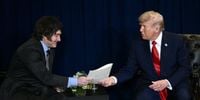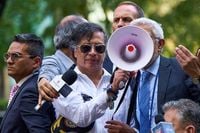On September 28, 2025, the world awoke to a new and unsettling chapter in U.S.–Latin American relations. President Donald J. Trump threatened to impose a fresh round of tariffs and sanctions against Brazil, just days after the country’s Supreme Court sentenced former president Jair Bolsonaro to 27 years in prison for attempting a coup. Bolsonaro, the far-right leader who once commanded Brazil’s highest office, was convicted of plotting to overturn the 2022 elections and assassinate then-president-elect Luiz Inácio Lula da Silva. The American response? A cascade of economic punishment, including a 50% tariff on Brazilian goods and Magnitsky sanctions targeting Supreme Court Justice Alexandre de Moraes, the man who presided over Bolsonaro’s trial. According to Dow Jones & Company, President Trump has remade Washington’s role in Latin America with a force not seen since the Cold War days of Ronald Reagan.
This latest episode isn’t just another skirmish in the long history of U.S. intervention in the region. As The Sunday Story notes, the United States is treating Latin America as its exclusive sphere of influence, deploying military and economic weight with abandon. But the new tariffs and sanctions on Brazil mark a dangerous escalation—one that many observers see as a direct attack on sovereignty and judicial independence. As Jose Atiles, an associate professor at the University of Illinois, puts it, "For a U.S. president to sanction another country’s judges for convicting his political ally is unprecedented—and a direct attack on sovereignty and the rule of law."
To understand the gravity of this moment, it helps to recall the long shadow cast by U.S. economic warfare in the hemisphere. From the embargo on Cuba, now stretching over six decades, to the relentless sanctions on Venezuela and Nicaragua, Washington has often wielded economic tools under the banner of promoting democracy. In practice, these measures have devastated civilian populations while failing to bring about the regime changes U.S. leaders once promised. The embargo on Cuba, for instance, has deprived generations of basic goods and medicines. In Venezuela, U.S. sanctions contributed to tens of thousands of excess deaths in a single year, according to experts cited by Atiles.
What’s different today, Atiles argues, is the open weaponization of tariffs as instruments of political punishment. Tariffs, once the preserve of trade policy, are being deployed to coerce foreign courts and punish governments for their domestic legal decisions. "This is not simply about trade or diplomacy; it marks a new phase of U.S. economic warfare," he writes. The implications are vast—not just for Brazil, but for any nation that dares to hold U.S.-aligned leaders accountable.
The legal framework underpinning these actions is equally controversial. The International Emergency Economic Powers Act of 1977 (IEEPA) allows the president to declare a “national emergency” and impose sanctions without congressional oversight. This tool has been invoked nearly 70 times, with 39 ongoing declarations still in effect. Courts have recently found tariffs imposed under IEEPA to be unconstitutional, yet the Trump administration continues to rely on it to justify sweeping interventions. Legal scholars argue that such sanctions violate the UN Charter, the Organization of American States Charter, World Trade Organization rules, and international human rights law. More fundamentally, they erode the very idea of international legality by substituting global norms with U.S. domestic law.
By 2024, the scale of U.S. sanctions had reached staggering proportions: one-third of the world’s population lived under some form of sanctions regime, with the U.S. responsible for more than 80% of unilateral measures. The effects are far-reaching. Exclusion from the U.S. banking system deters global financial institutions from engaging with sanctioned nations, forcing international compliance through over-compliance. Hospitals go without medical equipment, schools lack supplies, and families are cut off from remittances. "Sanctions kill, and yet they persist as key instruments of U.S. foreign policy and economic warfare," Atiles warns.
Brazil now finds itself at the center of this machinery. The tariffs and sanctions imposed in retaliation for a domestic judicial ruling signal a dangerous expansion of U.S. interventionism. This is not merely targeted pressure; it is a form of collective punishment meant to discipline Brazil and warn others across the hemisphere: prosecute U.S.-aligned leaders, and you will pay the price.
The U.S. approach in Latin America has always been fraught with tension, but recent events suggest a new level of audacity. In Venezuela, for example, the U.S. has supported regime change operations for years, recognizing opposition leader Juan Guaido as president from 2019 to 2023. Both Trump and Biden backed Guaido, but the effort failed to unseat Nicolas Maduro, who has since turned to China, Russia, and even India for support. As reported by veteran journalist Saeed Naqvi, "Caracas has opened its doors to Beijing, Moscow and New Delhi, finding in them not just buyers of oil but also shields against economic warfare." Four days before September 28, 2025, the U.S. Navy sank two Venezuelan ships it claimed were ferrying narcotics—a charge denied by Caracas—further inflaming tensions.
Trump’s first-term advisers, like National Security Adviser John Bolton, even considered a full-scale invasion of Venezuela. Secretary of State Rex Tillerson made no secret of his support for the Monroe Doctrine, famously declaring, "Monroe doctrine is alive and kicking." Today, the doctrine’s logic is being tested as outside powers like China and Russia stand firmly behind Maduro, challenging Washington’s traditional dominance in the region.
Meanwhile, the cracks in U.S. influence are beginning to show elsewhere. In Colombia, President Gustavo Petro took to the streets of New York at a pro-Palestinian rally, urging U.S. soldiers to "disobey Trump’s order." The State Department swiftly revoked Petro’s U.S. visa for what it called "reckless and incendiary actions." While there were no U.S. troops directly engaged in the Israel-Gaza conflict, the episode highlights the growing rift between Washington and some of its erstwhile allies in Latin America.
As alliances splinter and new business opportunities emerge in Africa and South Asia, the global order appears to be undergoing a profound transformation. French President Emmanuel Macron, in a 2022 address to his diplomats and military leaders, warned that "over 400 years of Western domination of world affairs was coming to an end." The rise of China, the resurgence of Russia, and the assertiveness of regional powers like Brazil and Venezuela are all symptoms of a settled order in flux.
For Latin America, the stakes are immense. The region’s leaders must navigate a landscape where U.S. interventionism has been refashioned through economic warfare, sanctions, and financial coercion. The message from Washington is clear: challenge U.S. interests or prosecute its allies, and face the consequences. Yet history also offers a lesson in resilience. As Atiles reminds us, "Latin America has resisted before, and it will resist again."
The coming months will reveal whether the latest round of tariffs and sanctions will force compliance or galvanize a new era of resistance and realignment. What’s certain is that the old rules no longer apply, and the world is watching as the balance of power shifts—one sanction, one tariff, one diplomatic rupture at a time.


